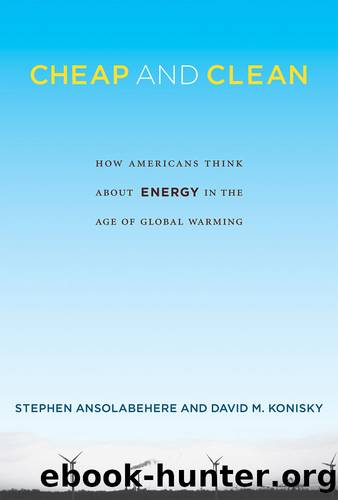Cheap and Clean by Ansolabehere Stephen;Konisky David M.; & David M. Konisky

Author:Ansolabehere, Stephen;Konisky, David M.; & David M. Konisky [Ansolabehere, Stephen]
Language: eng
Format: epub
Tags: science, public policy, environment, climate change
ISBN: 9780262027625
Publisher: MIT Press
Published: 2014-08-04T00:00:00+00:00
This experiment had no statistically measurable effect on support or opposition to coal, natural gas, or nuclear power. It registered a statistically significant increased support for expanding use of oil in electricity production, such that support for oil rose to approximately the same level of support for nuclear power and coal. All three fuels (coal, oil, and nuclear), however, remained relatively unpopular: most survey respondents wanted to reduce the use of coal, oil, and nuclear power slightly, even after learning their true costs. The very small effect of information about prices on attitudes toward traditional fuels is not surprising. These fuels are currently used, and the information provided indicated that they were all roughly the same cost.
Alternative fuel sources were a different story. Compared to the control group, respondents provided information about the relative current and future costs of energy sources were more likely to support the reduced use of wind, solar, and hydropower. These differences were each statistically significant. The average treatment effect ranged from about 0.23 for hydroelectricity to 0.40 for solar, meaning that having correct information shifted opinion roughly a quarter to four-tenths of a point on the future use scale. Americans still wanted to expand these fuels significantly, but their support was somewhat more tempered.
These results suggest caution for environmental activists who want to push these fuels aggressively in public debate. The more people learn the true cost of solar and wind, the less support these fuels will have. The effect of such a dialogue would not be enough to make coal or nuclear the preferred option of the American public, but it would be enough to cause people to think twice about the alternative energy sources. Years later, after the 2008 election, the Obama administration implemented heavy subsidies to solar firms hoping to jump-start the green energy industry. Solyndra and Evergreen Solar went bankrupt within two years, and the Obama administration was widely criticized for âpicking losers.â The 2002 experiment contained an important lesson. Public support for a fuel source does not mean that people ignore the economic costs of the fuel in judging a public policy designed to increase use of that fuel. The public popularity of solar power does not reflect the true costs, and upon learning the true costs, support for solar power weakens. It is not the case, then, that support for solar power leads people to ignore the costs; rather, the costs, when they are realized, are factored into public thinking.
The result of our 2002 experiment, then, predicts a very heavy advantage for incumbent fuels in the electricity sector. New energy technologies must overcome the initial costs of deploying that technology. Early adoptions are expensive and early adopters pay a heavier price. The effects of early adoption of a technology, if not properly managed, will be to increase electricity prices rapidly and in ways that the public becomes immediately aware of. That will have a subsequent effect of lowering public support for the policies required to introduce those technologies.
Download
This site does not store any files on its server. We only index and link to content provided by other sites. Please contact the content providers to delete copyright contents if any and email us, we'll remove relevant links or contents immediately.
Whiskies Galore by Ian Buxton(41525)
Introduction to Aircraft Design (Cambridge Aerospace Series) by John P. Fielding(32885)
Small Unmanned Fixed-wing Aircraft Design by Andrew J. Keane Andras Sobester James P. Scanlan & András Sóbester & James P. Scanlan(32570)
Craft Beer for the Homebrewer by Michael Agnew(17930)
Turbulence by E. J. Noyes(7696)
The Complete Stick Figure Physics Tutorials by Allen Sarah(7135)
Kaplan MCAT General Chemistry Review by Kaplan(6592)
The Thirst by Nesbo Jo(6432)
Bad Blood by John Carreyrou(6271)
Modelling of Convective Heat and Mass Transfer in Rotating Flows by Igor V. Shevchuk(6219)
Learning SQL by Alan Beaulieu(6031)
Weapons of Math Destruction by Cathy O'Neil(5825)
Man-made Catastrophes and Risk Information Concealment by Dmitry Chernov & Didier Sornette(5644)
Digital Minimalism by Cal Newport;(5388)
Life 3.0: Being Human in the Age of Artificial Intelligence by Tegmark Max(5182)
iGen by Jean M. Twenge(5158)
Secrets of Antigravity Propulsion: Tesla, UFOs, and Classified Aerospace Technology by Ph.D. Paul A. Laviolette(4984)
Design of Trajectory Optimization Approach for Space Maneuver Vehicle Skip Entry Problems by Runqi Chai & Al Savvaris & Antonios Tsourdos & Senchun Chai(4837)
Electronic Devices & Circuits by Jacob Millman & Christos C. Halkias(4744)
